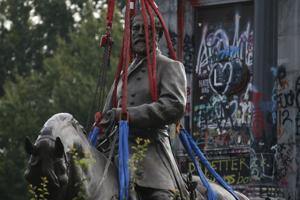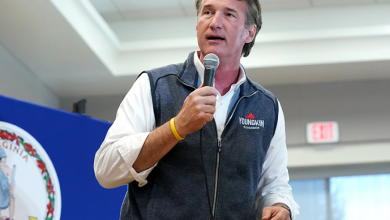Youngkin appointee resigns following remarks on slavery, Confederate statues

RICHMOND — One of Gov. Glenn Youngkin’s appointees to Virginia’s Board of Historic Resources has resigned following her remarks about the Confederacy and slavery.
Ann McLean, an art historian who has criticized the removal of Confederate statues, resigned Monday, according to Youngkin spokesperson Macaulay Porter.
McLean has opposed the renaming of buildings and removal of monuments related to the Confederacy and slavery — telling The Virginia Star “our heritage has come under a vicious attack.”
McLean’s resignation followed a “discussion about our Administration’s goals and priorities and Dr. McLean’s,” Porter said in an email.
“The Governor had previously acknowledged that he did not agree with Ann McLean’s statements and the Administration is focused on ensuring that our Commonwealth’s rich history and resources are preserved, the good and the bad, for future generations of Virginians and visitors,” Porter said. WRIC, the Richmond ABC affiliate, first reported that McLean was leaving the post.
On July 12 the administration had announced McLean’s appointment to the board, which oversees historic site designations.
In a July 18 appearance on “Richmond’s Morning News with John Reid” on WRVA, McLean said that “many people want to just flatten the whole Civil War to slavery.”
A central tension between northern and southern states that led to the Civil War, which lasted from 1861 to 1865, was disagreement over states’ rights — particularly whether states could permit individuals to own enslaved people.
McLean likened President Abraham Lincoln’s efforts in the Civil War to Russia invading Ukraine. She added that slavery would have eventually ended had the Confederacy remained a country.
“Slavery would have been outlawed in the South within five or 10 years but they wanted to do it on their own time,” she said.
In a Dec. 23, 2021, appearance on WRVA she also defended the erection of Confederate monuments.
“This whole tragedy is that these statues were built to tell the true story of the American South to people 500 years from now after everything calmed down,” McLean said. “But we have forces right here 150 years later that want to destroy the evidence of that story.”
McLean, who could not be reached for comment, was previously the head of Hunter Classical Christian School — which she founded — and she holds a Ph.D. in art and architectural history from the University of Virginia.
Frank Dukes, an architecture professor at UVa, said: “If she had stayed on the historic resources board, then she would have been exposed to many different truths of history than then she obviously has been exposed to before.”
Dukes is involved in Charlottesville’s efforts to reshape and contextualize its now-removed statue of Confederate Gen. Robert E. Lee.
McLean’s statements in media outlets came amid several years of debates surrounding the removal of monuments and memorials that venerate slaveholders and key Confederate historical figures.
Virginia and localities removed a number of Confederate statues in 2020, a year of reckoning about racial injustice — sparked, in part, by the murder of Minneapolis resident George Floyd by a police officer.
Following a 2020 change in state law that gave localities authority to do so, a number of cities and counties throughout Virginia have removed their Confederate statues. Richmond Mayor Levar Stoney ordered the removal of city owned Confederate statues from Monument Avenue, after demonstrators already had taken down several statues.
Last September, Virginia removed the state-owned statue of Lee on Monument Avenue after then-Gov. Ralph Northam prevailed in a court fight.
Dukes said he’s glad there has been more research and education over the years into more of the “complexity” of American history.
“We have to be able to approach that knowledge with an open mind and to be prepared, you know, to learn. I’m still learning very much myself,” Dukes said.
“My hope is that they’re going to get somebody who’s willing to confront the authentic histories that are far more complex.”
Porter did not give further details on when Youngkin might appoint a new person to McLean’s slot on the board.




